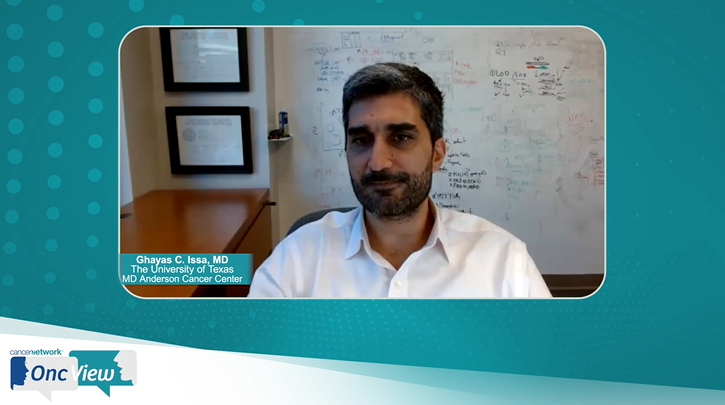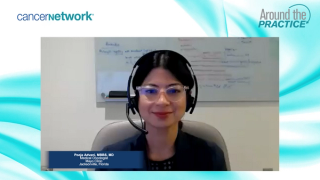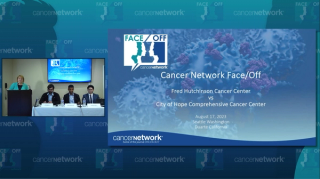
Leukemia
Latest News

Latest Videos

CME Content
More News

The safety profile of venetoclax following allogeneic hematopoietic stem cell transplantation in patients with chronic lymphocytic leukemia appears to be comparable with other reports in clinical trials.

Patients with chronic lymphocytic leukemia and small lymphocytic lymphoma can now receive treatment with pirtobrutinib.
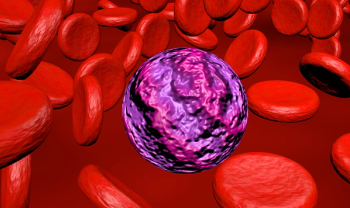
Safety data from the phase 3 PREVAPIX-ALL trial support the use of apixaban among pediatric patients with acute lymphoblastic leukemia who are at high risk of thrombosis.
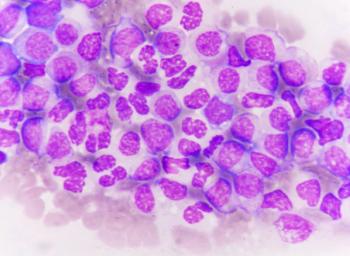
Data from the phase 2 FELIX study support the biologics license application for obecabtagene autoleucel as a treatment for patients with relapsed/refractory acute lymphoblastic leukemia.

Concluding their discussion, Drs Advani, Parrondo, and Chanan-Khan conclude that second-generation BTK inhibitors are the preferred first-line treatment in patients with chronic lymphocytic leukemia due to better efficacy and lower cardiovascular risk, with emerging therapies promising even better outcomes.

Doctors discuss that while cardiovascular side effects like atrial fibrillation and hypertension in patients with chronic lymphocytic leukemia are concerns with BTK inhibitors, they are manageable and should not deter prescribing these effective therapies; generally, atrial fibrillation is considered more challenging to manage than hypertension.

Impact of Treatment Duration on Development of BTKi-Related Atrial Fibrillation in Patients With CLL
Ricardo Parrondo, MD, explains that different BTK inhibitors have varying rates of cardiovascular side effects in patients with chronic lymphocytic leukemia, suggesting the choice between them should consider a patient's preexisting cardiovascular conditions, with acalabrutinib favored for hypertension concerns and zanubrutinib for atrial fibrillation issues.

Ricardo Parrondo, MD, discusses that in treating chronic lymphocytic leukemia, BTK inhibitors like ibrutinib can pose cardiovascular risks, including hypertension; he suggests that in choosing a BTK inhibitor one should consider the patient's preexisting cardiovascular conditions.

Asher A. Chanan-Khan, MBBS, MD, led a panel discussion surround the use of Bruton tyrosine kinase inhibitors for patients with chronic lymphocytic leukemia.

Karmanos Cancer Institute and Cleveland Clinic gave presentations regarding treatment of multiple myeloma and chronic myeloid leukemia in the latest Face Off.
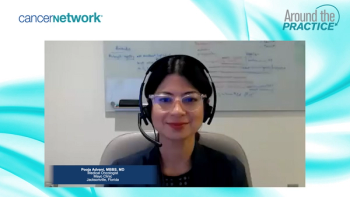
Pooja Advani, MBBS, MD, discusses that switching from ibrutinib to second-generation BTK inhibitors like acalabrutinib leads to fewer off-target side effects like atrial fibrillation while maintaining high disease control.

Experts discuss that for patients with chronic lymphocytic leukemia intolerant to the BTK inhibitor ibrutinib, due to side effects like arthralgia, myalgia, or diarrhea, switching to a second-generation BTK inhibitor can be effective and better tolerated.

Data from the phase 1/2 TRANSCEND CLL 004 study support an application for liso-cel as a treatment for patients with relapsed/refractory chronic lymphocytic leukemia or small lymphocytic lymphoma.

The partial clinical hold on a phase 1 study assessing NX-2127 in those with B-cell malignancies comes after the developer communicated intent to the FDA to move to a different manufacturing process.
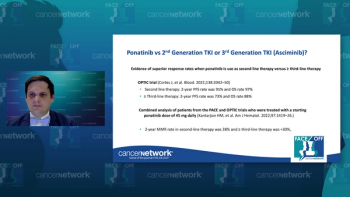
John C. Molina, MD, EdM, reviews data from the 3-year update from the OPTIC study, and other experts offer their impressions.
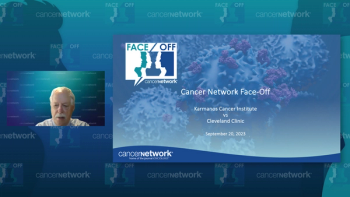
Experts in the field of chronic myeloid leukemia discuss the role of asciminib in the overall treatment landscape.
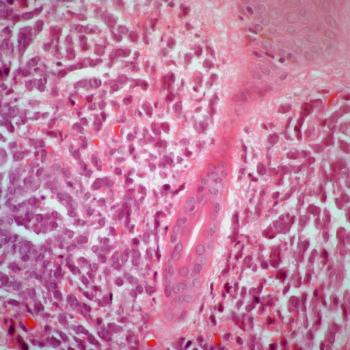
Adding all-trans retinoic acid to chemotherapy does not appear to improve complete remission rates compared with chemotherapy alone in patients with NPM1-mutated acute myeloid leukemia.

Medical expert outlines that resistance to BTK inhibitors in patients with chronic lymphocytic leukemia is commonly mediated by mutations in BTK or phospholipase Cγ2 proteins, and highlights new, unique mutation patterns in zanubrutinib; he also mentions emerging therapies including noncovalent BTK inhibitors and clinical trials focusing on BTK degradation for additional lines of therapy.

The panel discusses key data from the ALPINE trial comparing ibrutinib and zanubrutinib in relapsed chronic lymphocytic leukemia, showing a progression-free survival favoring zanubrutinib; Ricardo Parrondo, MD, suggests this may be due to its better toxicity profile, leading to longer patient adherence.

Data from a systematic review highlight a significantly higher risk of any bleeding and major bleeding in patients with treatment-naïve chronic lymphocytic leukemia treated with a second generation Bruton tyrosine kinase inhibitors.

Charles A. Schiffer, MD, reviews clinical trial data for asciminib in chronic myeloid leukemia and highlights financial toxicity concerns.
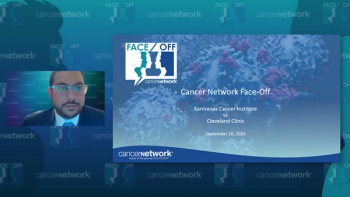
The expert panel discusses the potential role of olverembatinib in the chronic myeloid leukemia treatment landscape.

Medical expert discusses that when managing relapsed or refractory chronic lymphocytic leukemia, the goals are similar to first-line therapy, and he emphasizes using BCL-2 and BTK inhibitors, guided by factors such as previous therapies, patient preferences, and comorbidities.

Experts discuss the management of a patient with chronic lymphocytic leukemia who experienced adverse effects such as joint pain and atrial fibrillation while on treatment with ibrutinib, emphasizing the role of cardio-oncology and considering a switch to a second-generation BTK inhibitor for better safety and fewer drug interactions.

CB-012 is set to be investigated as part of the phase 1 AMpLify trial in patients with relapsed/refractory acute myeloid leukemia.



